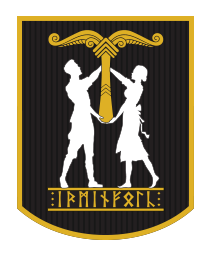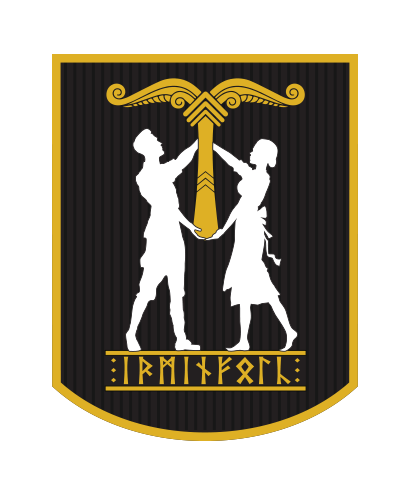Ritual Centers the Community.
The Irminfolk is a tax-exempt religious organization that is incorporated under the laws of New York State and is a Federally recognized 501(c)3 organization.
The Irminfolk serves as a philosophical, educational, religious, and social community of Folkish Heathens. We provide for a community of people from a broad spectrum of society in a family friendly environment.
Through the promotion of social gatherings, Heathen rites and rituals, museum outings, group hikes, Rune/Lore studies, community service projects, and regular meetups, our members and leadership strive to make the Irminfolk a visionary, professional, and cultured organizational and inspirational vehicle for our Folk.
We believe that this concept was strongly embodied in the Pre-Christian religions of our European ancestry. We strive then to motivate our Folk to to find that communion with their distant ancestors and to find their own link in that never-ending chain between the distant past and the far flung future. We do this by reconstructing, as best as we can from documents and evidence from long-ago, the ways our ancient European ancestors honored the Gods of the European Pantheon. We celebrate the holidays of our ancient ancestors without the Christian tinseling that veils their Pagan origins. We attempt to practice the rites and and ceremonies in the manner they did.
The Irminfolk’s Core Pantheon is the Gods and Goddesses of the Aesir and the Vanir – The Norse/Germanic Pantheon, with Odin as the Chief Godhead.
Branching further from the Sacred Pillar of Central Europe we embrace our Cousins to the South, of Greece-Roman Heathenry, and to the East, The Slavonic Gods like Swentowit and Perun. We recognize the ancestral Gods and Goddesses of our European cousins with tolerance, understanding and friendship.
But in the Irminfolk we’re not mere historical reenactors, meticulously mimicking the distant past like characters in a living history exhibit. While the aesthetics of ancient Europe inspire our creativity, we recognize that the spirit of our age calls for a more nuanced approach. We believe that Odinism is a living, breathing tradition—one that resides within each of us, igniting the folk-spirit that has been passed down through generations. Our ancestral folkways are not just a hobby; they are the essence of our worldview, guiding us along a path of self-discovery and growth.
For us, the essence of Heathenry lies much less in academic reconstruction than in the living, upward journey of our Folk. It’s about embracing the timeless wisdom of our ancestors while adapting it to the realities of our modern lives. This divine spark, this connection to our roots, is what guides us on our path. In the Irminfolk, we celebrate our heritage with reverence and respect, while keeping our traditions relevant in today’s world. Join us as we honor the past, embrace the present, and shape the future of Heathenry together.”
Ours is a quest to re-discover our ancestral path – and to ascend the upward path.
Political stance
The Irminfolk is not affiliated with any political movements or parties and does not subscribe to any political ideologies or initiatives. Individual members may and do hold their respective beliefs and affiliations. The beliefs, affiliations, words, and actions of an individual member acting in his own capacity does not reflect those of The Irminfolk or upon other members.
Radical politics is not our concern one way or the other. Political passions are not relevant to our mission, and are generally viewed by us with suspicion and reservation. While the Irminfolk uphold that everyone is entitled to his or her wrong opinion, as soon as that opinion manifests in problems for us, you will find our hospitality has reached its limits.
Getting involved in the Irminfolk
For those wishing to become involved with the Irminfolk, there are two general courses of action available to them depending on where you live.
The Irminfolk Odinist Community Located in New York State’s Upper Delaware Valley
If you live in close enough proximity to the Northeast Pennsylvania / Upper Delaware Valley area of the northeast United States, you can arrange to meet with us to discuss getting involved. Usually this first “moot” takes the form of a hike, museum outing or other physical or cultural activity. We are not very big on “pub moots”. Additionally, there are an open-to-the-public Irminfolk events throughout the year which a prospective enrollee may wish to avail himself to.
The Irminfolk Auxiliary program for members wherever they may live.
For those people who live too far away to be able to actively participate in the Community building of the Irminfolk but want to support us and partake of the benefits of membership we offer, you can become a member of the Irminfolk Auxiliary. For more information about the Irminfolk Auxiliary Program click here.
The Irminfolk’s structure: A businesslike operation.
There are two general categories of constituents in the Irminfolk. The Membership who are oathbound and serve in critical roles of running the Irminfolk, trusted with decision-making authority make up the vital cadre and administrators of the organization. They are differentiated from the Laity and the Irminfolk Auxiliary, which is a more nebulous arrangement for people who support our mission but are not in close proximity. The laity and auxiliary do not have authority to vote at thing and may not represent the Irminfolk in official business.
Steering the direction of the Irminfolk is our Board of Directors, consisting of individuals known as Stewards. This dedicated team oversees the overall planning and coordination of our programs. The Board comprises five Director positions: the President, two Vice Presidents (one for innengard, and one for utgard), a Recording Secretary, and a Financial Secretary. Working in tandem with the rest of the Irminfolk’s Oathed Cadre, they ensure the smooth and businesslike operation of our organization, facilitating the fulfillment of our mission and purpose.
Four times a year, the Board convenes for formal meetings called Things, governed by the rules of deliberative assembly. During these sessions, the Board assesses the organization’s progress, deliberates on new initiatives, and reviews financial documentation transparently. Additionally, throughout the year, the Cadre, responsible for managing committees and programs, meets informally to oversee the day-to-day operations. Routine decisions are typically made at the discretion of the Cadre, while significant innovations are discussed between Board meetings and formally proposed before the assembly for debate and voting.


